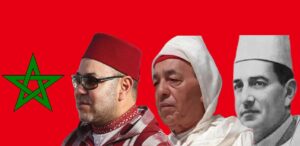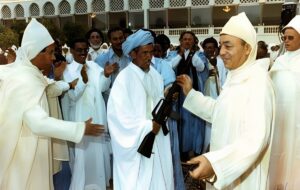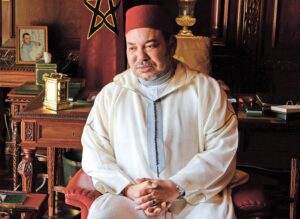"The fixed and the variable" in Security Council resolutions on the Moroccan Sahara

In just hours, a new Security Council resolution will be issued, renewing the mandate of the MINURSO mission in the Moroccan Sahara and renewing the invitation to the parties to the fabricated conflict, Algeria and its creation, the Polisario, to sit at the negotiating table, under the supervision of the UN Secretary-General's envoy, Staffan de Mistura, to reach a mutually acceptable political solution to this issue, which has been open for nearly half a century. Despite all this time passing, and the tensions that characterized its previous stages between major and regional powers, a sense of stability prevails in the resolutions issued by the Security Council over the past decade. Predicting the content of subsequent resolutions has become possible, with a high degree of accuracy. This is due to the entrenched nature of a set of "constants" in this file, with limited scope for "changing" matters that allow for some additions and interpretations between this resolution and subsequent ones. Here, we will attempt to address the most prominent fixed and changing factors in current and subsequent Security Council resolutions, until the time comes for a final settlement of this conflict:
The first constant or fact regarding the handling of the Western Sahara issue within the Security Council is that it is not a pressing issue on the international agenda, and therefore does not receive priority in the discussions or attention of the permanent members of the Security Council. Why? Because a set of fundamental facts related to this conflict have crystallized and become a "fait accompli" that the world's major powers deal with. Morocco has exercised de facto sovereignty over the Sahrawi territories since the mid-1970s, and most countries in the world treat this sovereignty as a fait accompli. Perhaps what further solidifies this fact is that the Arab and African environment, the European neighborhood, Islamic and international organizations, and the major powers with permanent membership in the Security Council do not separate their commercial, political, and economic relations with Morocco between its northern and southern regions. Indeed, agreements on fishing, agricultural exports, and phosphate exports cover Morocco from Tangier to Lagouira without raising any problems. Despite Algeria and the Polisario's desperate attempts to confuse Morocco and cast doubt on the legality of its dealings with its Sahrawi territories, respected legal bodies, most recently the prestigious British judicial institution, have refuted all these flimsy arguments and strengthened Morocco's legal position. Perhaps what further reduces the artificial Western Sahara conflict on the Security Council's agenda is the deep-rooted conviction among all its components that the Polisario mercenaries cannot create a hotbed of military tension with Morocco or in West Africa. This was confirmed when Morocco resolved the Guerguerat border crossing issue within hours, without the incident having any significant repercussions for the security or military situation in the region. This status of the Western Sahara issue within the Security Council is considered to be in Morocco's favor, and it is causing madness and agitation among its opponents, who are spending a great deal of money in their desperate attempts to suggest that there is tension on both sides of the border, through fictitious military statements that are published only by the Algerian Press Agency, to claim that this tension threatens international peace and security, in a way that requires the major powers to devote all their time to resolving this issue.
The second constant is that it is difficult to effect any change in Security Council resolutions, which the Kingdom of Morocco always welcomes and its opponents denounce. This situation is unlikely to change in the foreseeable future, given that the United States is the "penholder" charged with drafting Security Council resolutions related to the Western Sahara issue. It considers Morocco its most prominent ally in Africa and among Arab and Islamic countries, even before recognizing Morocco's sovereignty over its Sahara. It is therefore inconceivable that the United States would draft resolutions that it realizes could harm its Moroccan ally. The same position, albeit to a lesser extent, is expressed by Britain and France, which consider the autonomy proposal under Moroccan sovereignty to be the most realistic basis for closing this issue, which in turn is credited to Morocco's benefit. Russia and China, the two remaining permanent members with veto power, have never used their veto against any resolution that favors the Moroccan position or is opposed by Algeria. They are among the leading countries that do not differentiate in their trade relations with Morocco between its southern provinces and the rest of Morocco. This international alignment in favor of the Moroccan position in this fabricated conflict is driving Algeria and its protégé, the Polisario, crazy, and rendering all their international efforts a waste of effort, time, and money.
The two previous constants lead to, and perhaps even build upon, a third constant: the omission of the referendum in Security Council resolutions, and even the closing of the window for its revival, even though the Algerians included it in their national anthem, mentioned it in all their statements, and considered it the backbone of their foreign policy! This omission of the referendum option only came after years of attempts by international powers to organize it, before Algeria and the Polisario Front in particular contributed to obstructing it and convincing everyone of its impossibility, given the obstacles they placed in the way of determining the identity of those entitled to participate in it (i.e., the referendum). In the absence of a referendum, the international community has no other options to ensure that the inhabitants of the Sahrawi regions are responsible for managing their own affairs, except for Morocco’s initiative for autonomy, which is enshrined in the practices of the Sahrawis on the ground, and their massive participation in all Moroccan electoral consultations, whether legislative or local. This is what the world - with the exception of Algeria and a few other marginal countries - considers a living translation of the self-determination of these inhabitants, a practical embodiment of their Moroccan affiliation, and an endorsement that does not need theorizing about the control of these inhabitants over the management of their affairs, in a way that is envied by all the inhabitants of the Algerian provinces!!
Given these constants, what are the most significant changes? It can be answered with confidence that they boil down to more international pressure, which has been and will continue to be exerted on Algeria and its creation, the Polisario, to stop repeating the impossible referendum as the sole means of self-determination, and to sit down at the negotiating table to discuss the details of the autonomy plan, now that other options have been exhausted. This pressure can only be fulfilled by publicly declaring the "price" of Algeria's continued obstinacy, which is still being discussed behind closed doors. The failure of Algeria and the Polisario to accept international reality and discuss the autonomy proposal will lead the United Nations to adopt the "Kofi Annan option" and impose recognition of this plan, without either party having a role in it. This will then be followed by the step of forcing the return of the Sahrawi detainees in Tindouf to their homeland, closing this issue once and for all.
In conclusion, today we can place the immortal phrase of the Moroccan monarch, King Mohammed VI: “Morocco is in its Sahara and the Sahara is in its Morocco until God inherits the earth and all that is on it” in the category of an accurate reading of reality, and not in the category of wishes, as Morocco’s opponents like to distort. It is a statement that translates the constants we have spoken about, and which the world is increasingly recognizing day after day. Morocco’s opponents will be forced to deal with them in turn, or face the danger of a historic defeat that will end their very existence!!





